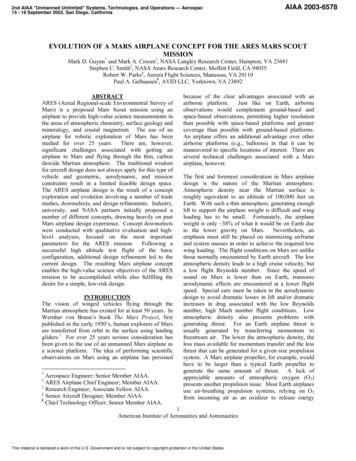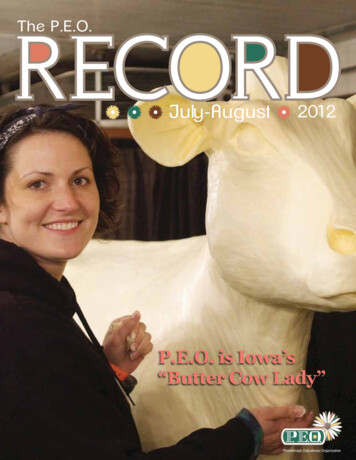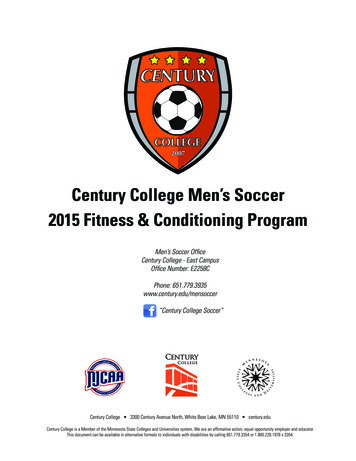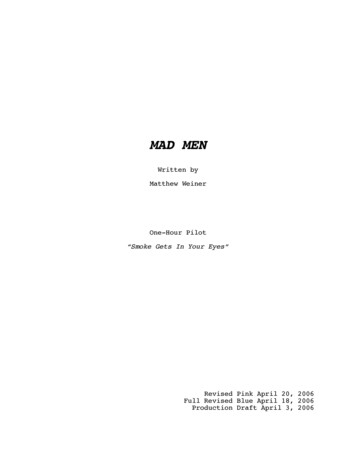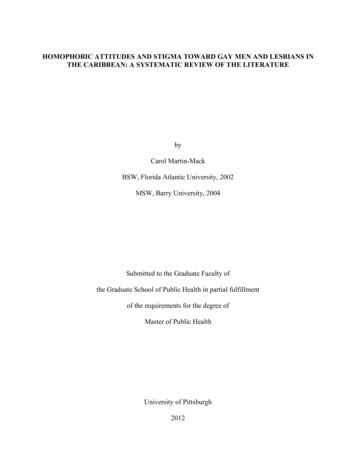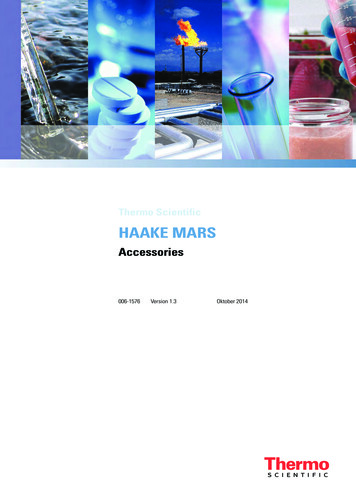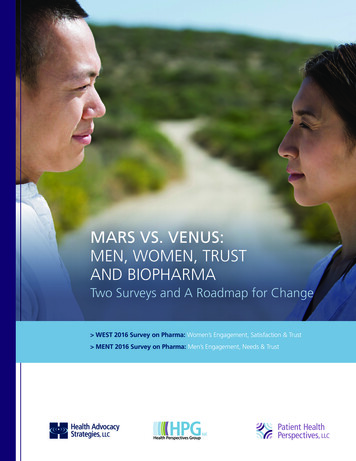
Transcription
MARS VS. VENUS:MEN, WOMEN, TRUSTAND BIOPHARMATwo Surveys and A Roadmap for Change WEST 2016 Survey on Pharma: Women’s Engagement, Satisfaction & Trust MENT 2016 Survey on Pharma: Men’s Engagement, Needs & Trust
TABLEO F CO N T E N T S2INTRODUCTION4OVERVIEW OF RESPONDENTS6FINDINGSCHERYL LUBBERT16 ANALYSIS19192021President and CEO,Health Perspectives Groupconnect@hpgroupllc.comBUILDING TRUST AND LOYALTY: AN ACTION PLAN FOR BIOPHARMAMenWomenMen and Women22 CONCLUSION1
INTR OD U C T IONWe don’t need a chart of the planets to tell us that menand women are different. These differences reveal themselvesin many ways, from consumer behavior to social interactionsand relationships.Researchers have shown that these differences exist because men’s and women’sbrains are actually built differently. A study of 1,000 brain scans1 showed that“on average, female brains are highly connected across the left and righthemispheres, and connections in male brains are typically stronger between thefront and back regions.”As a result, men tend to perform tasks predominantly using the left side of thebrain, which handles spoken language and fact retrieval along with logic andmathematical computations. Women, on the other hand, more often use bothsides of their brain. Because a woman’s brain has a larger corpus callosum linkingthe two sides of the brain, women can transfer data more quickly between theleft hemisphere and the right, which handles visual imagery, spatial abilities andinterpreting context and tone in communication.21. http://www.fitbrains.com/blog/women-men-brains/2. ODUCTIONMars vs. Venus: Men, Women, Trust and Biopharma — Two Surveys and A Roadmap for Change2
But brain scans can’t provide the full story about why and how men andwomen trust. So how can we quantify men’s and women’s perceptions of thebiopharmaceutical industry? Who do they trust and why? How do men andwomen want to connect with companies around their health?When it comes toTo explore this topic in more detail, we conducted two revealing surveysasking 300 men and 300 women about their trust in and impressions of thebiopharmaceutical industry:trust, brain scans can’t1. WEST 2016 Survey on Pharma: Women’s Engagement, Satisfaction & Trust2. MENT 2016 Survey on Pharma: Men’s Engagement, Needs & Trustmeasuring feelings andtell the whole story.They revealed that on this topic, the genders are at the same time similar and different.We conducted both surveys through our subsidiary Health Stories Project, anonline community of people inspired to tell their health stories to help others toconnect and learn.We explored the topic of trust because trust is the most important buildingblock of healthy relationships, between not only individuals but also consumersand organizations.As expected, our surveys showed several differences in how men and women perceivethe biopharmaceutical industry, but they also showed some surprising alignment.This analysis will explore gender differences and similarities in trust, understanding andcommunication, presenting strategies for connecting with men and women and aroadmap for building relationships with health consumers of both genders.INTRODUCTIONMars vs. Venus: Men, Women, Trust and Biopharma — Two Surveys and A Roadmap for Change3
ge24O VER VIE WO F R ES P ON D E N T SIn 2016, we conducted a survey of 600 U.S. healthcare decision makers.We surveyed 300 men and 300 women across a range of ages.300 MENage55-697.6% ge35-5300 WOMENage70 4age25-3434%OVERVIEW OF RESPONDENTSMars vs. Venus: Men, Women, Trust and Biopharma — Two Surveys and A Roadmap for Change4
%45%First, we made sure respondents hadrelevant re familiar with at least one ofthe12.3%top 10 pharmaceutical neca96.7%GlaxoSmithKlineJohnson& JohnsonMerck& Co.NovartisRocheSanofiof the Pfizerrespondentshave takenaprescription medication.Takeda*Top 10 by global salesRESPONDENTS’ FAMILIARITY WITH THE TOP 10 PHARMACEUTICAL COMPANIESRESPONDENT’S FAMILIARITY WITH THE TOP 10 PHARMACEUTICAL ineJohnson Merck & Co.& JohnsonNovartisPfizerRocheSanofiTakedaThen, we asked for their opinions on the trustworthinessof biopharmaceutical companies and stakeholders in thehealthcare space.OVERVIEW OF RESPONDENTSMars vs. Venus: Men, Women, Trust and Biopharma — Two Surveys and A Roadmap for Change5
FINDI N GSAGREE1. Reputation RankingAmong both men and women, the pharmaceutical industry’s reputation is only slightly higher than other “reputationally challenged” industries, including tobacco and oil. oth men and women ranked the technology and food industries as #1 and 2Bmost trustworthy, and the pharmaceutical industry trailed at #4 and 5 out ofseven, respectively. L IST OF INDUSTRIES PROVIDING GOODS AND SERVICES TO CONSUMERSRanked from Most Trustworthy (1) to Least Trustworthy od2FoodFinancial3Automobile ManufacturingPharmaceutical4FinancialAutomobile Manufacturing5PharmaceuticalEnergy and Oil6Energy and OilTobacco7Tobaccon 600FINDINGSMars vs. Venus: Men, Women, Trust and Biopharma — Two Surveys and A Roadmap for Change6
DISAGREE2. TrustworthinessThough the order of their selections is the same, men and women differ significantly in their level of perceived trustworthiness of the pharmaceutical industry among healthcare providers. hen asked to describe the trustworthiness of six categories of professionals, both gendersWagreed that pharmacists and providers such as doctors and nurses are the most trustworthy. owever, the survey showed that while only 18.7% of men describe the pharmaceuticalHindustry as extremely trustworthy, women’s opinions of the industry are even more critical:only 4.7% of women think the pharmaceutical industry is extremely trustworthy. hen compared to other healthcare service and product providers, the pharmaceuticalWindustry’s trust ranking among both men and women is closest to that of health insuranceproviders – and just above the government.PERCEIVED TRUSTWORTHINESS OF HEALTHCARE TWORTHYHealthcare Providers(Doctors, Nurses, 9.3%Pharmaceutical Companies18.7%4.7%Health Insurance Providers17.3%4.7%14%2.3%Governmentn 600FINDINGSMars vs. Venus: Men, Women, Trust and Biopharma — Two Surveys and A Roadmap for Change7
cesAGREEAstraZenecaJohnson3. GlaxoPrioritiesSmith& JohnsonMerck& Co.NovartisPfizerRocheSanofiTakedaKline nly 27% of men and 15% of women feel the pharmaceutical industry is “extremelyOinterested” in meeting the needs of patients and their families. Both men and womenbelieve the industry is more interested in meeting the needs of investors and shareholdersthan any other stakeholder.RESPONDENT’S FAMILIARITY WITH THE TOP 10 PHARMACEUTICAL COMPANIESWHO DOES PHARMA CARE94% ABOUT?100Men87%PHARMA IS EXTREMELY INTERESTEDMenIN MEETING THE NEEDS OF: 80.3% are Providers(Doctors, Nurses, etc.)35%24.3%19.7%2018.7%12.3%4.3%031%Patients andGilead their ohnson Merck & Co.& JohnsonNovartis 15% PfizerRocheSanofiTakeda24.3%Insurance Companies14%22.7%PharmaceuticalCompany Employees12%21.3%State and FederalGovernments8.7%0510152025303540n 600FINDINGSMars vs. Venus: Men, Women, Trust and Biopharma — Two Surveys and A Roadmap for Change8
DISAGREE4. Credible SourcesWe asked men and women whose perspectives they would find very or extremelycredible when forming an opinion of a company. Men’s top choice: a technical expert.This is compared to women’s top choice of a friend or family member, which tookthe #2 spot for men. en’s top three influencers were rounded out by an academic professional, showingMthe value men place on validated, vetted authority figures when they are lookingfor information they can trust. In contrast, women place a premium on trusted personal relationships. Looking at thetop six choices for women and men, three of women’s selections for most credible, including#1 and #2, are real people close to them or who have personal experiences that are relevant.The top six choices by men include four outside experts.WHO IS MOST CREDIBLE WHEN FORMING AN OPINION ABOUT A COMPANY?ExpertsReal PeopleMENVERY OREXTREMELYCREDIBLEWOMENTechnical Expert1Friend or Family MemberFriend or Family Member2Nonprofit or Advocacy Organization EmployeeAcademic Professional3Academic ProfessionalNonprofit or Advocacy Organization Employee4Technical ExpertFinancial or Industry Analyst5Employee of the CompanyEntrepreneur or Company Founder6Person Like Yourself Whom You Don’t KnowEmployee of the Company7Financial or Industry AnalystCEO of the Company8Entrepreneur or Company FounderPerson Like Yourself Whom You Don’t Know9Board of Directors of the CompanyBoard of Directors of the Company10CEO of the CompanyGovernment Official/Regulator11Blogger or Social Media Opinion LeaderBlogger or Social Media Opinion Leader12Government Official/Regulatorn 600FINDINGSMars vs. Venus: Men, Women, Trust and Biopharma — Two Surveys and A Roadmap for Change9
DISAGREE5. Pricing Transparency wice as many men think the pharmaceutical industry is very transparent aboutTdrug pricing, compared to women (18.9% vs. 8.7%). Also, almost 65% of womenthink the industry is not very or not at all transparent where pricing is concerned,compared with half of men.HOW TRANSPARENT IS THE PHARMA INDUSTRY ABOUT DRUG PRICING?MENverytransparentnottransparentat all18.9%22.9%2831.3%26.9%somewhattransparentnot t allnottransparentat allnot hattransparentnot verytransparentsomewhattransparent34.9%n 600FINDINGSMars vs. Venus: Men, Women, Trust and Biopharma — Two Surveys and A Roadmap for Change10
DISAGREE6. Impact of Recent Events: PricingEven after a year with high-profile negative attention on drug pricing, men weresubstantially less influenced by this focus than women. Almost two-thirds ofmen said their perception of the pharmaceutical industry has not changed due to recentattention on pricing, while fewer than half of women said they were unaffected.HAS ATTENTION TO DRUG PRICING CHANGED YOUR PERCEPTION OF PHARMA?MEN62%WOMEN42%36%31%22%8%22%non 600yesI don’tknownoyesI don’tknowFINDINGSMars vs. Venus: Men, Women, Trust and Biopharma — Two Surveys and A Roadmap for Change11
DISAGREE7. Impact of Recent Events: TrustWhen asked how any other recent events have impacted perception and trust of the pharmaceutical industry, men focused on lack of communication about facts andrationale from companies, while women questioned the industry’s drivingmotivation, looking at the bigger picture with a critical eye.HOW HAVE RECENT EVENTS IMPACTED YOUR PERCEPTION OF PHARMA?MEN’STOP RESPONSE54%“I think companies do notcommunicate effectively theirrationale for drug pricing.”“I think more thanever the industryputs profits beforecreating the besttreatments.”WOMEN’STOP RESPONSE69%FINDINGSMars vs. Venus: Men, Women, Trust and Biopharma — Two Surveys and A Roadmap for Change12
%AGREE4.3%12.3%8. Reputation fizerRocheSanofiTakedaZenecaSmith& JohnsonCo. SciencesWhen askedabout potentialinitiatives&pharmacould undertake to improve its reputation,Klineboth men and women agreed that talking directly with patients to betterunderstand their needs would have a lot of or significant impact, second onlyto providing financial assistance. Following in third place for both men and women:providing patients and caregivers with more education and support.RESPONDENT’S FAMILIARITY WITH THE TOP 10 PHARMACEUTICAL COMPANIESHOW CAN PHARMA IMPROVE ITS REPUTATION?10094%Provide FinancialAssistance to Patients80in Financial ovide Patients or24.3%18.7%Caregivers with More12.3%Education and men68.7%62.3%44.7%0Men84%GlaxoSmithKline80%Johnson Merck & Co.& Johnson67.7%Talk Directly withPatients or Caregiversto Better UnderstandTheir mbined results: A Lot of and Significant Impact.n 600FINDINGSMars vs. Venus: Men, Women, Trust and Biopharma — Two Surveys and A Roadmap for Change13
DISAGREE9. Communicating and Connecting mong respondents of both genders who said pharmaceutical companies shouldAcommunicate directly with patients and caregivers to understand their needs, women andmen agreed direct channels that offer the possibility of in-depth communication wouldhave the most impact. owever, they had differing perspectives on the channels that communication should take.HFor men, their top choice was creating an online community where the companycould engage with patients. Women preferred a more hands-on approach, choosingadvisory meetings or focus groups where patients could provide feedback to companieswith time for discussion in person, in a small group.HOW CAN PHARMA GATHER PATIENTS’ INPUT?MENCreate an online communitywhere the company andpatients/caregivers can engage69.8%Invite a group of patients/caregiversto regularly provide feedback onmedical and business decisions68%Invite a group of patients/caregiversto an in-person or online advisorymeeting or focus group66.5%A LOT OF ORSIGNIFICANTIMPACTWOMEN1Invite a group of patients/caregiversto regularly provide feedback onmedical and business decisions2Invite a group of patients/caregiversto an in-person or online advisorymeeting or focus group3Create an online communitywhere the company andpatients/caregivers can engagen 28460.2%56.7%52.8%n 281FINDINGSMars vs. Venus: Men, Women, Trust and Biopharma — Two Surveys and A Roadmap for Change14
DISAGREE10. Education and SupportAmong men and women whose perceptions of the pharmaceutical industry wouldbe positively influenced by more education and support, both placed more weight oninteractive approaches over reference materials, but again the order of the preferredmethods shows a subtle difference between the sexes. en’s selections favor programs that are more private, enabling them toMdiscuss their conditions and learn more with someone one-on-one, either someoneelse with the same condition or a nurse on a helpline. After the helpline option,women prefer to share their health experiences with others with the samecondition through an online community. H OW CAN PHARMA PROVIDE EDUCATION AND SUPPORT?MENDevelop a program that would enablea person to talk privately to another personwith the same medical condition69.8%Provide access to a nurse helpline69.1%Create an online community wherepeople could share personal experienceswith a medical condition65.1%Provide access to stories (written or video)of other people who are successfullymanaging their medical conditions64.7%Distribute educational brochures57.9%A LOT OF ORSIGNIFICANTIMPACT1WOMENProvide access to a nurse helpline58.9%2Create an online community wherepeople could share personal experienceswith a medical condition3Develop a program that would enablea person to talk privately to another personwith the same medical condition4Provide access to stories (written or video)of other people who are successfullymanaging their medical conditions5n 27853.9%50.4%48.2%Distribute educational brochures39.7%n 280FINDINGSMars vs. Venus: Men, Women, Trust and Biopharma — Two Surveys and A Roadmap for Change15
ANALY S ISThese two surveys provide interesting insight into how trustworthy men andwomen think the biopharmaceutical industry is and what approaches could bemost effective in impacting those opinions.While men and women had similar responses in some areas and differentresponses in others, review of all the data revealed several interesting take-aways:1. hen it comes to pharmaceutical companies, men are moreWtrusting overall than women – sometimes twice as trusting. Across all survey questions, while the ranking or weight of their responseswas often similar, women were universally less trusting of everything inthe survey – industries, individuals, communication approaches. For example, while both men and women gave very low rankings whenasked if the pharma industry is extremely trustworthy, 18.7% of menagreed, but only 4.7% of women did (full data, p. 7).Review of all thedata revealed severalinteresting take-aways.MENWOMEN18.7%4.7%have a less positive perspective overall, with a healthy2. Womendose of skepticism toward the biopharmaceutical industry. On any questions that required a value judgment, women’s responseswere almost always more negative than men’s responses. For example, when asked about the importance of meeting the needsof different categories of people, both men and women agreed thatinvestors and shareholders are the top priority for pharmaceuticalcompanies (38.7% of men and 34% of women). However, amongthe other five categories of people, men’s selections ranged from21%-31%, but the women’s responses dropped off significantly, allregistering in the teen and single-digit percentages (full data, p. 8).DIFFERENCE BETWEEN MEN’S AND WOMEN’S PERCEPTIONS: 1% 27% 24.3% 22.7%34%21.3%19.7% 15% 14% 12%8.7%ANALYSISMars vs. Venus: Men, Women, Trust and Biopharma — Two Surveys and A Roadmap for Change16
On the question referenced in #1 above, of men’s responses onwhether each of six categories of healthcare providers were extremelytrustworthy, three of the six categories were ranked in the 20% range,with the other three categories in the teens. In contrast, four of thecategories were ranked by women in single digits (and the other twowere in the very low 20s) (full data, p. 7).DIFFERENCE BETWEEN MEN’S AND WOMEN’S �sResponses3.26.3%26.3% 21.7% 18.7% 17.3%21%20%14%9.3%4.7% 4.7%2.3% n approaches and initiatives that pharmaceutical companiesOcould adopt to repair their untrustworthy image, men and womenwere in agreement, with relatively small differences in emphasisonly in the rankings they gave to each option.Even with their differences, there are a number of places where the options andpreferences of men and women intersect, opening the door to reach both groupswith well-designed programs and communication.ANALYSISMars vs. Venus: Men, Women, Trust and Biopharma — Two Surveys and A Roadmap for Change17
SUMM A RYTwo impactful approaches:engaging directlyTaken as a whole, these survey results show that biopharmaceutical companieshave a significant opportunity to take action and positively impact bothmen’s and women’s perceptions of the industry’s trustworthiness.and providingpersonalized support.It’s fortunate that, based on feedback in the surveys, men and womenagreed on two impactful approaches — engaging directly and providingpersonalized support.They also are making it clear that they want a two-way dialogue and a seat at thetable with biopharmaceutical companies. Health consumers are ready and willingto take a more active role and engage with companies. This gives consumers theopportunity to better understand the overall process and share their perspectives,and it gives companies opportunities to build relationships and deeply understandtheir consumers’ wants and needs.SUMMARYMars vs. Venus: Men, Women, Trust and Biopharma — Two Surveys and A Roadmap for Change18
B UI LDI N G T RU S T A N D L O YA LT Y:AN AC T ION P L A N F O R B I O P H A R MABelow, we outline a number of initiatives that biopharmaceutical companies can implement to support the two key areas ofimpact identified in this research. While all of these programs target both men and women, we have segmented some of theapproaches based on specific top responses from men and women in the surveys.MenCLOSED ONLINE COMMUNITIESOnline communities enable patients and caregivers to support one another,share experiences and interact directly with the company to co-create solutionsto specific problems. These forumsprovide opportunities for sharing and atwo-way dialogue between companiesand their health consumers forinsights, education and support. Thesecommunities can be built compliantlyto enable private interaction.The ValueProposition:Connectionimproves outcomesand builds trust.PEER-TO-PEER MENTOR PROGRAMSVolunteer patients and caregivermentors assist others throughongoing, private one-on-onecommunication by email orphone over months or years.These programs enable compliantcommunication, because thementors can be trained withapproved protocols.The ValueProposition:Patients benefitfrom theexperience oftrained peers.BUILDING TRUST AND LOYALTY: AN ACTION PLAN FOR BIOPHARMAMars vs. Venus: Men, Women, Trust and Biopharma — Two Surveys and A Roadmap for Change19
WomenPATIENT COUNCILSThe ValueProposition:Ongoingrelationshipsfoster a richnessof feedback.This carefully selected and trained group of patients and caregivers can beconsulted periodically on an ongoing basis through in-person meetings, videoconferencing and written feedback. Patient councils can help companies improvetransparency, especially when summaries of discussions and decisions are sharedwith the larger patient community.CO-CREATION WORKSHOPSAt these workshops,patients and caregiverscan interact directly withthe company to co-createsolutions to specificproblems. Examples ofchallenges that can beaddressed collaborativelyinclude identifying thebest channels to reachundiagnosed or underserved patients, how to support clinical trial participation orthe best support services to offer caregivers.The ValueProposition:Collaborationwith stakeholderssolves problems.BUILDING TRUST AND LOYALTY: AN ACTION PLAN FOR BIOPHARMAMars vs. Venus: Men, Women, Trust and Biopharma — Two Surveys and A Roadmap for Change20
Men and WomenADVISORY MEETINGSThese one-time meetingsbring together 10-12patients and caregivers toshare their patient journeyand perspectives on topicsranging from marketingand clinical trials toeducation.The ValueProposition:Hear first-handfrom healthcaredecision makerswhat they wantand need.REAL PATIENT STORIESPeople respond to the real, unvarnished,emotional stories of other people. Whenyou share information or seek ways tocommunicate a message, use pictures,videos, quotes and bios of real patients.Real patient stories can be incorporatedinto just about any planned education orpromotional activity.The ValueProposition:Real storiesresonate.PATIENT SPEAKER’S BUREAUPatient advocates who want toshare their personal stories canspeak at internal and externalevents. With special attentionto training the patients oncompliance and privacy guidelines,these speakers can leave a lastingimpression with the audience andprovide the patient with a positiveimpression as well.The ValueProposition:People rememberstories told byothers like them.BUILDING TRUST AND LOYALTY: AN ACTION PLAN FOR BIOPHARMAMars vs. Venus: Men, Women, Trust and Biopharma — Two Surveys and A Roadmap for Change21
CONCL U S IONThough men and women are different, they both have trust issues wherebiopharmaceutical companies are concerned, and the industry has muchroom for improvement.The good news is that our surveys show there are ways to improve perceptionsof the industry. And men and women are telling us how: build an active dialoguewith them, listen to their concerns, learn from their perspectives and make thempart of your team.The approaches we’ve identified can help put these concepts into action,while delivering the added benefit of cultivating loyal patients who feelsupported and heard – a real connection.The biopharmaceuticalindustry can positivelyimpact the perceptionsof men and women.CONCLUSIONMars vs. Venus: Men, Women, Trust and Biopharma — Two Surveys and A Roadmap for Change22
Mars vs. Venus: Men, Women, Trust and Biopharma — Two Surveys and A Roadmap for Change. 9 We asked men and women whose perspectives they would find very or extremely credible when forming an opinion of a compan

